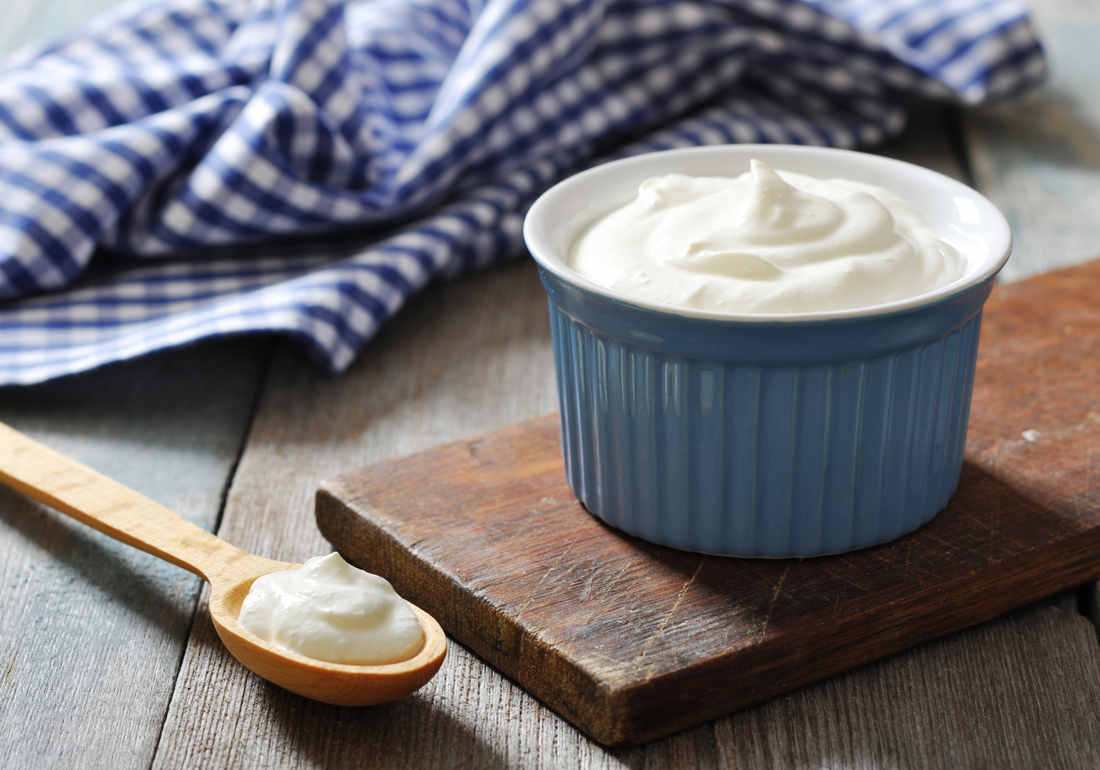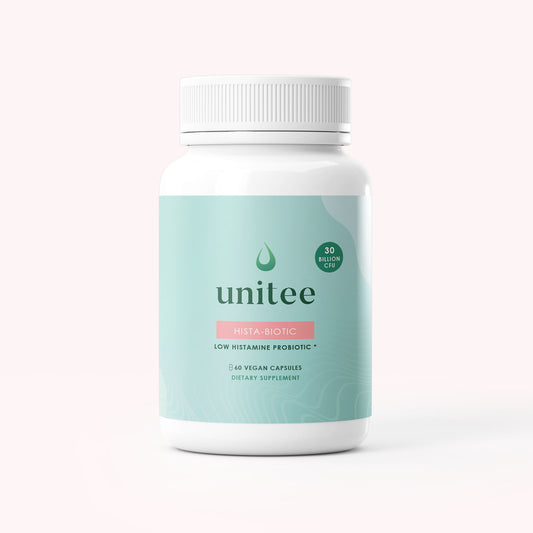Our body houses over 100 trillion bacteria which are, in some way, involved in every single bodily function, ranging from immune health to daily mood and energy.
Disorders such as histamine intolerance are no exception when considering the role of gut bacteria in your symptoms.
In fact, in my previous post about what causes histamine intolerance, I explain how gut bacteria can not only be a contributor to your histamine symptoms but can actually be the main underlying cause of histamine intolerance itself.
With the multitude of systems impacted by histamine intolerance and the multi-symptomatic nature of this disorder, there will always be some level of bacterial involvement.
This is exactly why finding the best probiotic for histamine intolerance is always going to be important. So, if you've been looking for something just like that, your search is finally over.
Let's get started.
The Importance of Probiotics for Histamine Intolerance
Probiotics are one of the most essential supplements for healing histamine intolerance. Because histamine intolerance essentially starts in the gut (1), often due to an overgrowth of histamine-producing bacteria, lack of maintenance of healthy, beneficial bacteria, as well as inflammatory and immune reactions, adding probiotics to your histamine-busting supplement routine is an essential part of the healing process. Not only do they supply the body with key nutrients that maintain overall health, they help to bring back balance within the digestive system itself to mitigate some of those awful symptoms you're dealing with as a result of your histamine intolerance.
Before you reach for your bottle of probiotics and swallow them with the hopes that they help, there's a catch: most probiotics actually produce histamine.
Wait, what? That's right. Even those healthy strains of bacteria you've been taking daily may actually be making your symptoms worse.
But don't feel guilty about having taken them in the past! Accidentally taking high histamine probiotics is, of course, a simple mistake to make. You've likely been told probiotics are good for your gut and overall health, so naturally many people turn to popular brands when feeling poorly, not recognizing that most common strains will actually produce histamine and cause symptoms to continue, or worse, increase!
The trouble is, finding low histamine probiotic supplements is darn near difficult. It's like finding a salad at a restaurant that doesn't contain high histamine ingredients. Just like a 'normal salad' works for most people, neither salad nor everyday probiotics work for those of you living with histamine intolerance!
So, I'll dive into this topic and outline how to make your decision on probiotics for histamine intolerance.
Before I do that, let's talk a little more about why addressing overall gut health and especially the microbiome is essential to healing from histamine intolerance.
How Gut Bacteria Influence Histamine Intolerance
Throughout nature and in our environment, bacteria are involved in both the production and degradation of histamine. It's no different in the human digestive tract.
When we consume foods containing the semi-essential amino acid, histidine, certain types of bacteria within the gut can convert this amino acid into histamine (2). Remember, histamine is not all doom and gloom. It's actually an important part of our immune system where its release helps to protect us from potential foreign invaders. That's why we have these mechanisms in place to provide us with a stable availability of histamine to use when we need it most!
So, when histidine is converted to histamine, it increases our internal histamine levels. That's even if the food itself was not considered a histamine-rich food. Now, in most cases, the conversion of histidine to histamine is non-problematic and even beneficial.
But for those who are living with histamine intolerance and experience histamine-related allergic reactions, the constant conversion of histidine to histamine can be a problem, especially when there's an imbalance of the type of gut bacteria that degrades histamine; or worse, a higher content of histamine-producing bacteria on top of it! Any or all of these factors can then be the reason there's a buildup of excess histamine in their body.
Histamine degrading bacteria are fairly interesting. They're generally from the lactobacillus species that are expected to inhabit a healthy gut. Go ahead and take a quick peek at the label and ingredients list of your common probiotics. You'll see lactobacillus is usually at the top. And for good reason! Not only do they help with histamine breakdown, they play a significant role in the overall health of the gut.
Ok, ok! I just told you not to take those probiotics. What's up with that? Well, it's really because not all lactobacillus species degrade histamine. Some produce it! Right, now you can see why it can be very difficult, and downright confusing having to choose a probiotic to help with your histamine intolerance. In a minute, I'll get into how to solve the puzzle, but back to bacteria causing histamine to behave badly...
The bottom line is, when the levels of these histamine-degrading bacteria fall too low, it's going to contribute to a chronic increase of internal histamine levels.
But why the heck is your gut bacteria so out of whack to begin with?
There are several reasons these bacterial populations can go haywire, including illness, pathogenic invasion, dietary factors, antibiotic use, chronic stress and other environmental and lifestyle influences. Unfortunately, it's the lactobacillus species in general, including the histamine-degrading variety, that often take the first hit. They're not needed in the greatest quantities to begin with, so when there's a strong influencing factor against them, such as those mentioned above, it doesn't really take much to land them in trouble.
It means that any additional histamine coming into your system can cause those symptoms to flare, because there just isn't enough support to break it down (read more about diamine oxidase and its deficiency and how it may be contributing to this problem).
I this it's important to mention here that it's this very point, and the consideration that bacterial produce histamine is the very same reason why histamine intolerant individuals should avoid fermented foods (bone broth, kefir, wine, cheese). These foods use histamine-producing bacteria in the process of fermentation but, while the bacteria are busy digesting and fermenting away to produce your wines and cheeses, they also turn them into very high histamine foods!
In nearly all cases of histamine intolerance, it thus goes without saying: in order to reduce the histamine levels in the body, I always recommend eating a low histamine diet and finding the right probiotics for histamine intolerance.
It's time to get into just that...
Restoring Gut Bacterial Balance With the RIGHT Probiotic to Ward Off Those Symptoms of Histamine Intolerance
I’ve done a lot of research to find you the absolute best probiotics for histamine intolerance. The list below details exactly which of those have been shown to be beneficial probiotics for histamine intolerance, which ones should be avoided, and which may still be in question (or may only benefit certain symptoms).
Low Histamine Probiotics and Strains to Look For
When it comes to reducing symptoms, these are the probiotics I recommend to my clients with histamine intolerance.
- Bifidobacterium infantis
- Lactobacillus gasseri
- Bifidobacterium breve
- Bifidobacterium bifidum
- Lactobacillus salivarius
- Lactobacillus rhamnosus (especially LGG): May help stabilize mast cells (3) and reduce the sensitivity of histamine and allergy-associated receptors while up-regulating anti-inflammatory cells (4).
- Bifidobacterium longum: Known to be a histamine degrading probiotic (5). It may help reduce the post-meal inflammatory response and prevent or improve intestinal hyperpermeability (“leaky gut syndrome”).
- Bifidobacterium lactis: May help break down histamine and tyramine.
- Lactobacillus plantarum: May help your body break down other biogenic amines, including tyramine (6).
Probiotic Strains to Avoid
These species may increase your body’s natural histamine production or contain histamine themselves.
- Lactobacillus casei
- Lactobacillus Bulgaricus
- Streptococcus thermophilus
- Lactobacillus delbrueckii
- Lactobacillus helveticus
Additional Probiotic Strains of Importance
I’ve found these strains are either still being evaluated or have been effective in treating specific symptoms.
- Lactobacillus reuteri: Although many low histamine foods lists put this bacterial strain in a histamine producing category, Lactobacillus reuteri is an interesting case. In addition to raising histamine, it also is helpful in increasing levels of anti-inflammatory cyclic adenosine monophosphate (cAMP), which promotes gut health.
- Saccharomyces-Boulardii: This is a low histamine yeast that also helps regulate digestive issues, like diarrhea, a symptom many people with histamine intolerance suffer with. Many people have been found to tolerate S. boulardii, despite it being a type of yeast, where yeast overgrowth can contribute to and even cause histamine intolerance.
- Lactobacillus lactis – This strain is still being debated by scientists and medical professionals as to the role it may have in histamine intolerance (8); we're still on the fence about whether it's helpful or harmful for the condition.
- Lactococcus Lactis – While it may sound and look very similar to the one about, it's slightly different in that it's not a lactic acid producing bacteria. This is a strain used to make some high-histamine foods such as fermented dairy products, but some studies found it to be histamine-neutral (9).
-
Lactobacillus acidophilus – This strain has been heavily studied by medical professionals and lower doses (below 1 billion CFU) appear to be histamine neutral while reducing inflammation and improving gut health. It's also a strain that's commonly used to treat antibiotic associated diarrhea, or travellers diarrhea (10).
The Best Probiotics for Histamine Intolerance
Although it's easy to put together a list of low histamine bacteria, finding an actual brand in stores that carries a probiotic formulation that's contains only beneficial bacteria for histamine intolerance can be very difficult.
High histamine species from the 'avoid' or 'questionable' lists, such as Lactobacillus acidophilus (in doses above 1B CFU) or Streptococcus thermophilus, tend to be some of the most commonly found strains in products available in health food stores and pharmacies.
In my extensive work of using probiotics for histamine intolerance sufferers, I’ve found this to be the best low histamine probiotic, as it contains only strains that have shown to be histamine-friendly. Most of my clients are able to incorporate this probiotic into their low histamine supplement routine without issue and experience beneficial results for gut health and overall symptoms.
This probiotic, paired with a low histamine diet, promotes a healthy gut bacteria balance AND helps reduce histamine intolerance symptoms.
So, adding a low histamine probiotic if you're living with histamine intolerance is a great place to start, but you might still have questions. Below I'm going to answer a few common questions I often get from my clients, to give you a more comprehensive overview of how you can continue improving your gut bacterial balance with confidence!
FAQ: Probiotics for Histamine Intolerance
Should everyone with histamine intolerance be taking probiotics?
This is a personal decision. More research is showing that health begins in the gut, so I do believe low histamine probiotics are one of the most important supplements for histamine intolerance, however therapy plans can always be done without supplements. I do find that without them, the progress to healing simply tends to be slower. But it all depends on whether you want to see more progress in your results sooner, or whether you prefer to avoid supplements all together. It's important to note that some people just don't do well with supplements, so leaving them out of your routine is ok, too!
Can I take probiotics in the form of yogurt?
Absolutely! However, the same principle applies. Make sure that the bacteria in your chosen yogurt are all low histamine strains. In general, commercially prepared yogurts all tend to contain high histamine strains, but you can make your own yogurt at home using low histamine probiotics from the strains listed above.
Why do some probiotics with similar / same names make me feel worse than others?
There are variations at the species vs strain levels of probiotics. The sub-types we use in our low histamine probiotic formulation have been specifically studied to reduce histamine, and we third party test our products to ensure they contain exact match strains. Other probiotics may have the same species name but not be an exact match strain to that which is histamine neutral or antihistamine.
References:
- Schnedl WJ, Enko D. Histamine Intolerance Originates in the Gut. Nutrients. 2021;13(4):1262. Published 2021 Apr 12. doi:10.3390/nu13041262
- Brosnan ME, Brosnan JT. Histidine Metabolism and Function. J Nutr. 2020;150(Suppl 1):2570S-2575S. doi:10.1093/jn/nxaa079
- Forsythe P, Wang B, Khambati I, Kunze WA (2012) Systemic Effects of Ingested Lactobacillus Rhamnosus: Inhibition of Mast Cell Membrane Potassium (IKCa) Current and Degranulation. PLoS ONE 7(7): e41234. https://doi.org/10.1371/journal.pone.0041234
- Oksaharju A, Kankainen M, Kekkonen RA, et al. Probiotic Lactobacillus rhamnosus downregulates FCER1 and HRH4 expression in human mast cells. World J Gastroenterol. 2011;17(6):750-759. doi:10.3748/wjg.v17.i6.750
- Takeda, Y., Nakase, H., Namba, K., Inoue, S., Ueno, S., Uza, N. and Chiba, T. (2009), Upregulation of T-bet and tight junction molecules by Bifidobactrium longum improves colonic inflammation of ulcerative colitis. Inflamm Bowel Dis, 15: 1617-1618. https://doi.org/10.1002/ibd.20861
- Capozzi, V., et al. Biogenic Amines Degradation by Lactobacillus plantarum: Toward a Potential Application in Wine. Frontiers in Microbiology. Volume 3. 2012. 10.3389/fmicb.2012.00122
- Thomas CM, Hong T, van Pijkeren JP, Hemarajata P, Trinh DV, Hu W, et al. (2012) Histamine Derived from Probiotic Lactobacillus reuteri Suppresses TNF via Modulation of PKA and ERK Signaling. PLoS ONE 7(2): e31951. https://doi.org/10.1371/journal.pone.0031951
- Linares DM, Del Río B, Ladero V, et al. Factors influencing biogenic amines accumulation in dairy products. Front Microbiol. 2012;3:180. Published 2012 May 28. doi:10.3389/fmicb.2012.00180
- Delgado S, Mayo B. Phenotypic and genetic diversity of Lactococcus lactis and Enterococcus spp. strains isolated from Northern Spain starter-free farmhouse cheeses. Int J Food Microbiol. 2004;90(3):309-319. doi:10.1016/s0168-1605(03)00323-4
- María Remes Troche J, Coss Adame E, Ángel Valdovinos Díaz M, et al. Lactobacillus acidophilus LB: a useful pharmabiotic for the treatment of digestive disorders. Therap Adv Gastroenterol. 2020;13:1756284820971201. Published 2020 Nov 24. doi:10.1177/1756284820971201

Anita Tee
My name is Anita Tee. I'm a nutritional scientist who specializes in histamine intolerance. I hold a Master of Science in Personalized Nutrition and a Bachelor of Science in Human Biology and Psychology. For the past ten years, I have used my experience in nutritional and medical health sciences to create a scientifically backed, natural approach to healthcare that relies 100% on evidence-based research. As I previously suffered from - and overcame - histamine intolerance, my focus is to increase recognition and expand the available resources and protocols available for resolving this particular disorder. To date, I have helped over 4,000 individuals fully resolve or better manage their histamine intolerance symptoms.









